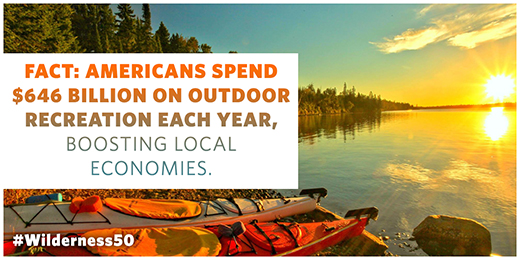
Fifty years ago today, President Lyndon Johnson signed two landmark bills, ushering in a new era of conservation.
The Land and Water Conservation Fund Act codifies the simple premise that when we take something from the earth, we have a responsibility to give something back. Using revenues from offshore oil and gas development, the Land and Water Conservation Fund has made critical investments in nearly every county in the United States. The LWCF has been used to increase access to the outdoors for hunting, fishing, and other recreation, to protect iconic places like National Parks and Civil War battlefields, and to advance over 40,000 local projects.
Thanks to the Wilderness Act, more than 109 million acres of wild land have received our country’s strongest protections, ensuring that future generations can continue to enjoy these places as they are today, and as they were hundreds of years ago. Designated wildernesses promote clean air and water, provide habitat for iconic wildlife, and protect places of incomparable natural beauty for all Americans to experience and enjoy.
But more than that, these laws protect what the novelist Wallace Stegner called “the geography of hope,” a vision of the American continent in all its vastness, its wildness, its natural power. “Something will have gone out of us as a people if we ever let the remaining wilderness be destroyed,” Stegner wrote in 1960. “We need wilderness preserved — as much of it as is still left, and as many kinds — because it was the challenge against which our character as a people was formed.”

Protecting the outdoors is not just good for our air and water — it’s good for our economy. In 2012, over 900 million visits to national parks, national monuments, and other federally managed lands and waters helped support over $646 billion in spending on outdoor recreation.
But our work to conserve America’s great outdoors is far from over. Right now, too many Americans lack easy or safe access to parks. Climate change is placing new stresses on lands, waters, and wildlife. Too many of our rivers, lakes, and ecosystems are choked with pollution.
That’s why President Obama has called on Congress to fully and permanently fund the Land and Water Conservation Fund and to act on dozens of conservation proposals that have been introduced by Democrats and Republicans alike. In the meantime, the President will use his executive authority to protect our outdoors and our heritage by designating new national monuments — as he has 11 times so far.
As we mark the anniversary of these important laws, let’s celebrate what we have accomplished over the past 50 years and redouble our efforts to work together to preserve the wild places that define the American character and to leave behind a healthy, beautiful country for future generations.
Mike Boots is the Acting Chair of the Council on Environmental Quality. John Podesta is Counselor to the President.
You should also see:

